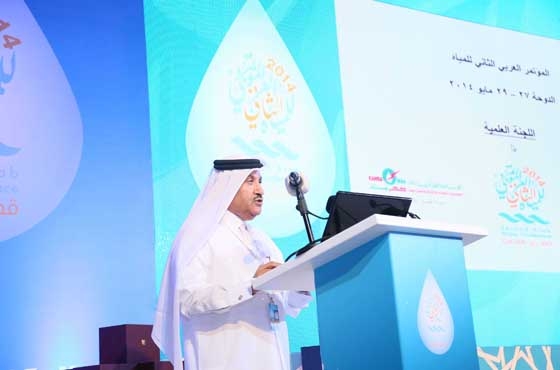The Second Arab Water Conference which was hosted in Doha under the patronage of HE Sheikh Abdullah Bin Nasser Bin Khalifa Al-Thani, the Prime Minister and Minister of Interior of the State of Qatar, from 27-29 May 2014, came to an end with a number of recommendations to achieve greater efficiency in the management of water in the Arab countries.
The Arab Water Conference, which was organized by Qatar General Electricity and Water Corporation “KAHRAMAA” in cooperation with the Arab Ministerial Water Council, addressed creative and sustainable solutions to meet the challenges currently faced by the region.
On the concluding day of the conference, HE Eng. Essa bin Hilal Al Kuwari, President of Qatar General Electricity and Water Corporation (KAHRAMAA), and Chairman of the Conference’s Executive Committee, thanked the delegates and the representatives of the Arab states for their contributions and screened presentations.
Speaking on the occasion, he said: "All our stakeholders were committed to addressing the critical issue of water security in the region along with their suggested ways and means to tackle the challenge. The issue will be further pursued by the leaders of the Arab world. The presence of His Excellency the Prime Minister and Minister of Industry, along with the Deputy Prime Minister and the Minister of Energy & Industry of the State of Qatar, as well as many leading ministers and high-ranking diplomats from across the region shows the collective importance of water-related issues.”
He further said that we should continue the dialogue started in Doha at higher level to help create short and long-term strategies for the Arab world. The expert analysis presented at the 2nd Arab Water Conference is of the highest quality and we hope this will be a roadmap for policymaking in our region, he added.
The second Arab Water Conference, witnessed a number of scientific sessions that reviewed studies conducted by leading experts from the region. The concluded sessions covered water as well as food security and the adoption of modern techniques and methodologies that can ensure future sustainability and promote the rational management of natural resources.
He also added that it was imperative that the dialogue is further continued and more similar summits are needed at the top levels to encourage scientific thought and to develop a greater understanding of the challenges and solutions that the region embraces and confronts.
Speaking at the occasion, Arab League representative, Dr. Jamaleddine Jaballah said that the scientific platform offered by the conference is the ideal way to meet the myriad geographically distinct challenges faced by the region and that the Arab Ministerial Water Council will continue to promote the preservation and optimal use of this invaluable source of life.
He added that the combination of the scientific findings presented at the congress and the diligent management of national strategies based on the recommendations of the conference will be conducive for the region's future.
Eng. Ali Saif Al-Malki, Chairman of the Conference's Scientific Committee and Director of Water Network Affairs at KAHRAMAA presented the conference recommendations on behalf of the Scientific Committee. He first thanked H.E. Sheikh Abdullah Bin Nasser Al Thani, Prime Minister and Minister of Interior of the State of Qatar, for his patronage of the conference and H.E. Dr. Mohammed bin Saleh Al- Sada, Minister of Energy and Industry for his active participation in the open panel discussions.
He also praised the efforts of Eng. Essa bin Hilal Al Kuwari, Chairman of the 2nd Arab Water Conference for his able leadership and for being an active advocate for the conference across many platforms and for reiterating the State of Qatar's commitment to this cause.
Among the major recommendations proposed by the Scientific Committee were the need for stronger legislation for the water sector and the use of modern techniques for the effective development, management and utilization of groundwater systems.
The committee also recommended the use of treated sewage water for agricultural and industrial purposes, as well as new methods for harvesting rainwater, including the use of dedicated reservoirs wherever possible.
The adoption of advanced agriculture and irrigation standards based on the climate and topography of each country and the stricter policing of pollution and contamination factors were suggested to avoid negative impacts on agricultural output. The Scientific Committee stressed the importance of continuing the dialogue on this important subject.
The conference also called on the member states of the Arab league to promote awareness within their member countries and to activate public service programs that encourage the rational use of water. Countries were also encouraged to develop policies that augment awareness through actions. These include reducing leakage in national potable water systems, improving the operational efficiency of networks and plants, as well as elevating the quality standards of drinking water.
The Committee also highlighted the importance of encouraging the private sectors to enter into partnerships in programs to achieve greater water and food security in the region.
At the end of the summit, HE Eng. Essa bin Hilal Al Kuwari, presented certificates of achievements and appreciation to the presenters of the selected conference papers and Arab League representatives. Members of the Scientific Committee and the Organizing Committee and volunteers were also recognized for their contributions.
ifpinfo
20 June

























































